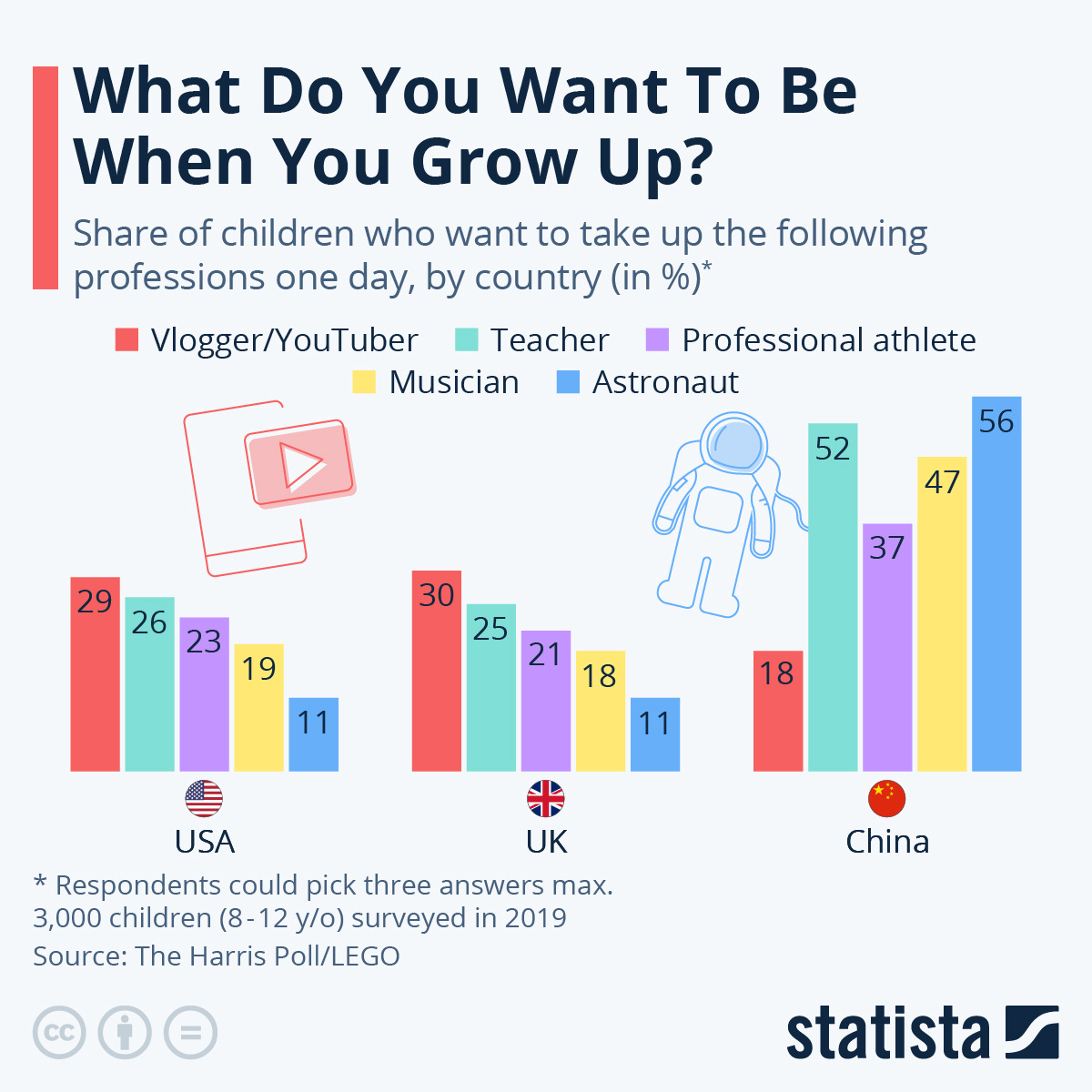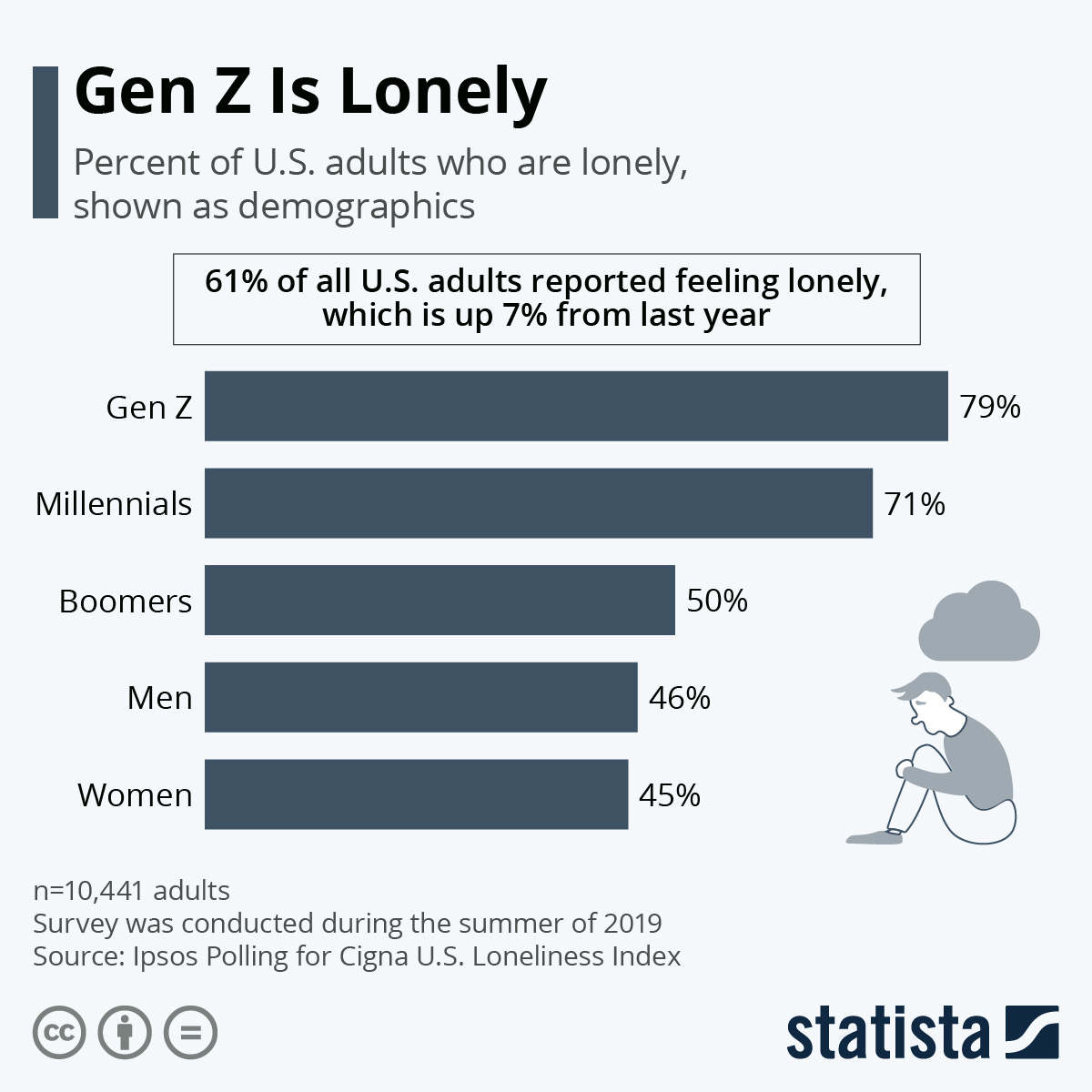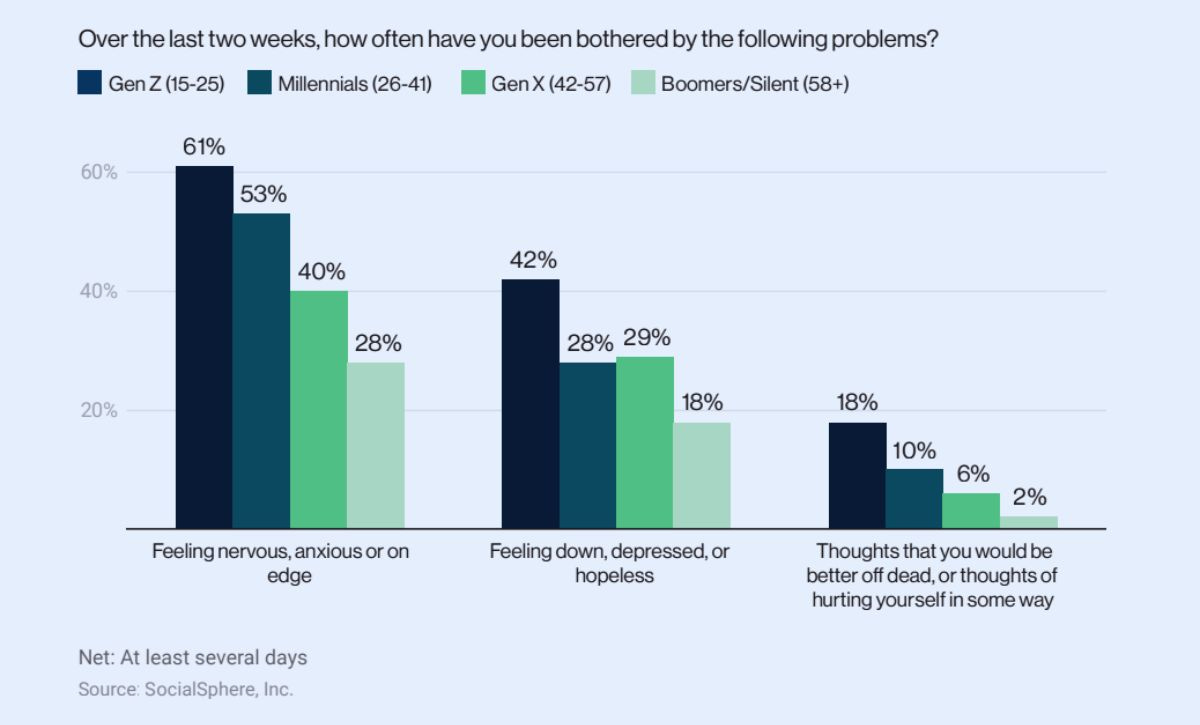We can’t take breaks.
-Grace Atwood, professional influencer
The market of social media influencers is worth $6.5 billion. Research shows that 86% of young Americans say they could see themselves as influencers. Becoming a “social media star” is the fourth most popular career aspiration for kids today. When asked, American and British kids - ages 8 to 12 - said they would rather be a YouTuber than an astronaut.
There are plenty of role models for this career path. YouTuber MrBeast has built a $50 million based on videos of extreme stunts, cash giveaways, and gaming. YouTubers, Instagrammers, Twitchers, and Tik-Tokers can reach millions in revenue. That said, the median salary of an influencer is around $45,000. Astronauts make around $100,000.
Worse yet, influencers have to hustle harder than your average astronaut. If you’re dependent on ad dollars based on followers, reach, views, likes, engagements, clicks, shares, hashtags, and conversions, the only certainty of continuous currency is to be consumed constantly. As Women’s Health explains the scenario:
For Grace Atwood, 41, who has been working in the influencing space for 13 years, it’s being unable to step away from work. “We can’t take breaks” or our numbers drop, Atwood says, explaining that when she stops posting for the weekend she’ll notice a 30 to 40 percent decline in Instagram story views.
In the influencer world, you step away from the phone and risk a plunge in profit. Real life is a risk that isn’t worth the reward. Social media influencer Nate Garner, who has millions followers on Instagram, told The New York Post: “Social media … has [made] me become a loner [in the real world].”
Beca Alexander, founder of an influencer marketing agency, told the Post that this is a common problem:
One of the things about this space that no one really talks about … is how sometimes sad some of these influencers are,” says Alexander, who’s worked with thousands of social media stars. She says loneliness is common: partly because influencers have exhausting schedules, packed with travel and intense content creation goals; partly because jealous peers pick on them or ignore them; and partly because many seem more comfortable online than in the real world, something that helps them create their Internet persona in the first place.
All the evidence shows that social media makes us lonelier and lamer. The more influencer-first the platform, the lonelier it seems to get.
Gen Z and millennials, our most connected generations, are the loneliest. And this survey was conducted before COVID.
Who are influencers primarily influencing? Themselves.
Where do they do it? In isolation.
Why do they do it? Because anonymous attention is more profitable than personal attention.
In the first part of Litverse’s Screen-First Souls series, explaining why it might be your fault that you’re lonely, we explored the scientific evidence that proves as strong a correlation between loneliness and social media as lung cancer and cigarettes and concluded, shockingly, that the user may be to blame if they choose to ignore the evidence and continue to pick up the phone and say they’re lonely.
The influencer industry highlights the inconvenient truth that disconnecting is not only impossible but unprofitable: how can we even think to put down the phone when so much currency is priced on constant connection and even ethic has gone electric? We hustle harder than ever, but we do it in front of phones instead of faces.
Event Horizon Hustlers
Hustling in a hustle culture is nothing new.
In 1888’s The American Commonwealth, British diplomat Lord James Bryce observed the country’s hustle culture as something disturbed and deathly in determination and desperation. Why, Bryce wondered, was everyone rushing around?
The constant reaching forward to and grasping at the future does not so much express itself in words, for they are not a loquacious people, as in the air of ceaseless haste and stress which pervades the West… each darting wither and thither with swift steps and unique mien, driven to and fro by a fire in the heart. Time seems too short for what they have to do, and results always come short of their desire. One feels as if caught and whirled along in a foaming stream, chafing against its banks, such is the passion of these men to accomplish in their own lifetimes what in the past it took centuries too effect. Sometimes in a moment of pause, for even the visitor finds himself infected by the all-pervading eagerness, one is inclined to ask them, “Gentlemen, why in heaven’s name this haste? You have time enough. No enemy threatens you. No volcano will rise from beneath you. Ages and ages lie before you… why complete in a few decades what the other nations of the world took thousands of years over in the older continents?
The difference today is that if someone says they’re “hustling” in the internet economy, they’re probably hunched over a screen or making a face at a webcam. The “foaming stream” still rages, but the flow and the foam is metaphysical. Almost every white-collar job requires productivity actualized within abstraction. The digitization of hustle culture is why we are lonely: we are assured, just like influencers, that the more time we spend staring into the computer, the more assured we are about our future fame and fortune.
The Puritans would be proud: they believed that if someone had a strong work ethic, it was a sign that God had chosen them for salvation. Those who couldn’t focus or find motivation were heretics of hustle culture and already damned. This is what Bryce didn’t understand: in a country of people with no history but the present, profit is the only way to assure yourself of not only a present and a future but a past. Now, the only way to build that profit - and that past - is to be hustling on the pocket Bibles that we call phones but hold holy in our palms and fill with prayers all the same.
Lonely? You may have fallen victim to the cult of the hustle.
Here are three warning signs:
1. You’ve Decided Social Activities are Inconvenient.
In giving us a world in our pocket, smartphones teach us there’s always something better happening. Getting together face-to-face can seem pointless when potential profits, whether from influence or crypto or just one more email, are just a tap or swipe away. Seeing people is inconvenient: they could be boring or say something incorrectly about an issue or idea. It’s more stressful to reach out and plan and meet up with people knowing, in the back of your head, there’s a far superior world to see just a pocket-sized window away.
An active social life has been proven to make people live longer. A study at the University of Oxford found that men should hang out at least twice a week to stay healthy and happy. Even if that means leaving the house.
Lonely? Maybe you’re convinced that any degree of undesirable interaction is sacrilege to the religion of convenience and comfort we mistake for “hustling.”
2. You’ve Become Illiterate.
Books have given me a magic portal to connect with people of the past and the present. I know I shall never feel lonely or powerless again.
-Lisa Bu
In my friend Erik Hoel’s aging-like-wine essay Fiction in the Age of Screens, he explains why the golden age of television can’t compete with a good novel: there’s no way to get inside a character’s head. The research shows that reading books increases empathy. Prose gives us the ability to understand ourselves and others through deep sentiments that go unspoken on the screen, gifting us with new symbols that show us we aren’t in this alone after all.
There’s one problem: more than 50% of Americans haven’t finished a book in the past year. The lonelier generations read the least.
In a connected hustle culture, we only know the persona - of others and ourselves. The performance becomes perception and the truth becomes pixels on a screen and without reading, we never entertain the idea there may be something behind the curtain - or that there’s a curtain at all. No matter the number of Booktoks, books are over for younger generations. And so is the language granted to us by books that names the stars in the galaxies of our hearts, giving them light.
Lonely? You probably gave up on literature.
3. You Choose Comfort to Cure Anxiety.
I’ve really had bad anxiety my entire life, and driving definitely triggers it for me.
-Spencer Lynch, “Gen Z-er,” NBC interview
In sacrificing an entire generation of by schoolchildren by imprisoning them on behalf of eighty-five year-olds with preconditions that were marked by healthcare professionals for insurance purposes as dead from COVID-19 if they were infected by COVID-19 at the time of their death whether it killed them or not, the lockdowns of COVID showed one thing for sure: we prioritize collective reactions to displays of digital concerns rather than lived experiences to imbue our identity with an international ideology: better safe than sorry.
Maybe it should be no surprise that a generation was told for three years that social activity was sinful and selfish is now crippled with nerves, depression, and fantasies of self-harm. More than 60% of Gen Zers have been diagnosed with an anxiety disorder. Consuming constant chaos in their hands, Gen Z is so busy convincing themselves and others that they care about the world that there’s no time to experience it for themselves. This generation drinks less, parties less, socializes less, and has sex less than any generation before them. Only 25% have a driver’s license.
In a hustle culture where every mistake goes on some kind of permanent record and most profit is from screens, not people, why would these young hustlers risk recklessness? What is the reward, if it can’t be shared or measured?
Lonely? Have you tried thinking about what you want to do, instead of the world at your fingertips wants to do?
The Doors of Perception
While manufacturing memes in meretricious monasteries, Gen Z taunts older generations and gets unconditional admiration back. A media run by millennials admires the fragility of global empathy and ignores the fact that no teenager can save the world all at once but can easily be doomed to hopelessness by seeing too much, too fast, and being unable to do anything but swipe. So we hustle harder, assuming we’ll find our hearts along the way.
A life worth living must be felt, not formed on phones. Memories can’t be memed. Devices help us discover things, but not our selves. The door is open. Go through it without your phone and see what happens. Not feeling like doing that? At least pick up a book.
Get started with the Screen-First Souls series with “Lonelier Than Ever? Maybe It’s Your Fault.”










And where are the parents of Gen Zers and what are they doing to change this sad scenario of suffering screeners?? Do the 'rents read? Do they volunteer at schools? Limit screen time? Set an example by socializing ? Loneliness is incumbent upon teens; it's a part of individuation. But there are healthy ways to address it. Go to church.
Great Prose Alert for "meretricious monasteries" 👏👏👏
I still think the only logical solution is to have metering on these apps, tied to a phone's identifier so you can't switch accounts to get around it. The toll constant engagement takes on influencers and influenced alike is such that you'll never break them from the scroll without built-in limitations. Gen Z has been used as data-set guinea pigs by Meta and ByteDance, and as you so persuasively point out, continuous engagement is the currency of the realm. Time to snap the cycle.